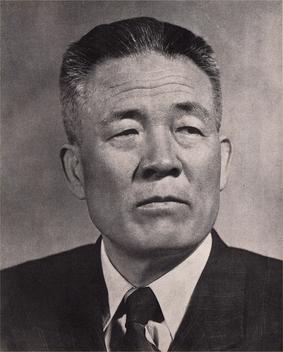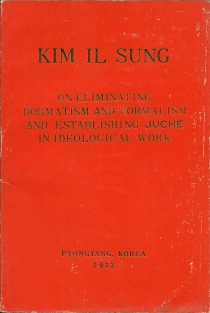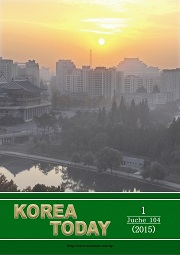
Kim Jong Il was a North Korean politician who was the second supreme leader of North Korea. He led North Korea from the death of his father Kim Il Sung in 1994 until his death in 2011, when he was succeeded by his son, Kim Jong Un. Afterwards, Kim Jong Il was declared Eternal General Secretary of the Workers' Party of Korea (WPK).

Juche, officially the Juche idea, is the state ideology of North Korea and the official ideology of the Workers' Party of Korea. North Korean sources attribute its conceptualization to Kim Il Sung, the country's founder and first leader. Juche was originally regarded as a variant of Marxism–Leninism until Kim Jong Il, Kim Il Sung's son and successor, declared it a distinct ideology in the 1970s. Kim Jong Il further developed Juche in the 1980s and 1990s by making ideological breaks from Marxism–Leninism and increasing the importance of his father's ideas.

"Aegukka", officially translated as "Patriotic Song", is the national anthem of the Democratic People's Republic of Korea, more commonly known as North Korea. It was composed in 1945 as a patriotic song celebrating independence from Japanese occupation and was adopted as the state anthem in 1947.
The Democratic Front for the Reunification of Korea (DFRK), also known as the Democratic Front for the Reunification of the Fatherland (DFRF) or the Fatherland Front, was a North Korean popular front formed on 25 June 1949 and led by the Workers' Party of Korea (WPK). It was initially called the Fatherland United Democratic Front.

Andrei Nikolaevich Lankov is a Russian scholar of Asia and specialist in Korean studies and Director of Korea Risk Group, the parent company of NK News and NK Pro.
Brian Reynolds Myers, usually cited as B. R. Myers, is an American professor of international studies at Dongseo University in Busan, South Korea, best known for his writings on North Korean propaganda. He is a contributing editor for The Atlantic and an opinion columnist for The New York Times and The Wall Street Journal. Myers is the author of Han Sǒrya and North Korean Literature, A Reader's Manifesto, The Cleanest Race, and North Korea's Juche Myth.
The North Korean famine, also known as the Arduous March, was a period of mass starvation together with a general economic crisis from 1994 to 1998 in North Korea. During this time there was an increase in defection from North Korea which peaked towards the end of the famine period.

Reading is a popular pastime in North Korea, where literacy and books enjoy a high cultural standing, elevated by the regime's efforts to disseminate propaganda as texts. Because of this, writers are held in high prestige.

The Workers' Party of Korea (WPK), also called the Korean Workers' Party (KWP), is the sole ruling party of the Democratic People's Republic of Korea, commonly known as North Korea. Founded in 1949 from a merger between the Workers' Party of North Korea and the Workers' Party of South Korea, the WPK is the oldest active party in Korea. It also controls the Korean People's Army, North Korea's armed forces. The WPK is the largest party represented in the Supreme People's Assembly and coexists with two other legal parties that are completely subservient to the WPK and must accept the WPK's "leading role" as a condition of their existence. The WPK is banned in the Republic of Korea under the National Security Act and is sanctioned by the United Nations, the European Union, Australia, and the United States.

Kim Il Sung was a North Korean politician and revolutionary. He founded the Democratic People's Republic of Korea, commonly known as North Korea, which he led as Supreme Leader from its establishment in 1948 until his death in 1994. Afterwards, he was succeeded by his son Kim Jong Il and was declared Eternal President.

The Tomb of King Dongmyeong, also known as the Tomb of King Tongmyŏng, is a mausoleum located in near Ryongsan Village, Ryokpo-guyok, Pyongyang, North Korea. One of the tombs is the royal tomb of Jumong, the founder of the ancient Goguryeo Kingdom, the northernmost of the Three Kingdoms of Korea. King Jumong was given the posthumous name of King Dongmyeong. In total, there are 63 individual tombs of the period. The area around Dongmyeong's grave contains at least fifteen known tombs believed to belong to various vassal lords. The tomb has achieved World Heritage status as part of the Complex of Goguryeo Tombs inscribed by UNESCO in 2004 under Criteria (i), (ii), (iii) and (iv) covering an area of 233 hectares with a buffer zone of 1,701 hectares. A unique feature of it and the other extant tombs in the area are the wall paintings depicting blossoming lotuses, indicative of Buddhism practiced and perhaps prevalent in Korea around 277 BC to 668 AD.
The award system of the Democratic People's Republic of Korea was initially created less than one month after the foundation of the Republic. During the years of Japanese occupation of Korea, many of the future leaders fled to the Soviet Union. During World War II many if not close to all party leaders and Korean People's Army commanders served in the Soviet Army and as such adopted many of the Soviet awards criteria for their own. During the late 1940s and until the Sino-Soviet Split in late 1958, orders and titles were made in the Soviet Money Mints in Moscow or Leningrad. Soviet made awards were modeled after Soviet orders and made of sterling silver. Initially the orders were attached to clothing with a screw-plate, but after Soviet production stopped, production was moved to North Korea. The screwback was replaced with a pin and the silver content was replaced with cheap tin. With the exception of a few examples of modern orders, Soviet and Czech KPA awards are the most sought after in current militaria markets.
The August faction incident, officially called the "Second Arduous March", was an attempted removal of Kim Il Sung from power by leading North Korean figures from the Soviet-Korean faction and the Yan'an faction, with support from the Soviet Union and China, at the 2nd Plenary Session of the 3rd Central Committee of the Workers' Party of Korea (WPK) in 1956. The attempt to remove Kim failed and the participants were arrested and later executed. Through this political struggle, Kim Il Sung quashed all opposition to him within the central party leadership.

Foreign Trade of the DPRK is a North Korean magazine. It covers North Korean companies that are looking to export their products and introduces their contact details. The magazine is affiliated with the North Korean Committee for the Promotion of International Trade. It is published quarterly by the Foreign Trade Publishing House of North Korea. The magazine is published in English, Chinese, French, Japanese, Russian and Spanish.

Han Sorya was a Korean writer, literary administrator and politician who spent much of his career in North Korea. Regarded as one of the most important fiction writers in North Korean history, Han also served as head of the Korean Writers' Union and Ministry of Education.

North Korea–Sweden relations are the bilateral relations between North Korea and Sweden. The countries have had diplomatic relations since 7 April 1973. Sweden has had a long-term commitment in North Korea and its relations with the country are exceptionally close among Western nations. Sweden is one of the major contributors of humanitarian aid to North Korea.

The Academy of Sciences of the Democratic People's Republic of Korea or State Academy of Sciences, formerly the National Academy of Sciences, is the national academy of sciences of North Korea. It was founded in 1952, and until 1981 was responsible for all research conducted in the country before various organizational reforms and splittings of academies were conducted.
This is a list of works important to the study of North Korea.

On Eliminating Dogmatism and Formalism and Establishing Juche in Ideological Work, also known as the "Juche speech", was a speech delivered on 28 December 1955 by Kim Il Sung. The address mentioned his Juche ideology by name for the first time. It is considered one of Kim's most important works and a "watershed moment" in North Korean history. Views differ if the speech used the term juche to launch an ideology or more conservatively to assert that the Korean people were the subject of the revolution. The former believes that Juche, as a distinct ideology, was developed by Hwang Jang-yop on his re-discovery of the speech. The speech was published for the first time in 1960 and in many subsequent, heavily edited revisions since.













